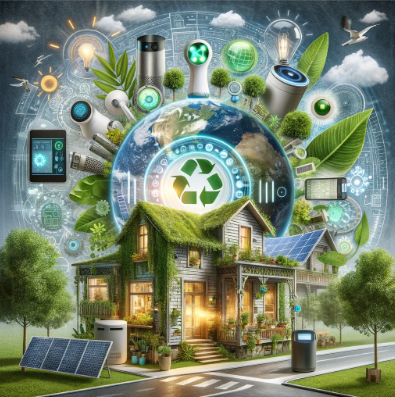BALANCING SUSTAINABILITY - The Challenge of AI-Powered Smart Homes
As the AI ecosystem continues to evolve, smart home devices are becoming more intelligent and capable, promising a transformative experience in how we interact with our surroundings. However, this technological advancement comes at a significant environmental cost that raises questions about sustainability.
The integration of AI, like OpenAI's ChatGPT, into smart home devices is a step toward creating hyperrealistic voice assistants that can mimic human interactions. But this innovation demands massive amounts of data and energy. Currently, over 60% of the world's electricity is generated from fossil fuels, contributing to climate change. A study published in the journal Joule warned that widespread adoption of generative AI could significantly increase energy consumption, potentially equaling the entire energy usage of a country like Ireland.
The urgency of addressing climate change and the need to reduce fossil fuel consumption have led to calls for action on the energy-intensive AI sector. This convergence of concerns ties two seemingly apocalyptic scenarios: world-dominating AI and world-ending climate change. The question arises: are more energy-intensive smart homes truly worth the environmental burden?
Traditional smart home devices use simplified AI systems that provide limited, preprogrammed responses. In contrast, generative AI, such as GPT, generates original responses by considering multiple factors and vast datasets. While this technology offers unprecedented capabilities, it also requires considerably more computational resources and energy, potentially offsetting the environmental benefits of smart homes.
Efficiency becomes a critical factor in determining the environmental impact of generative AI in smart homes. As technology evolves, developers aim to minimize energy consumption while delivering advanced AI capabilities. Initiatives like JoshGPT, a generative AI smart home device, are striving to achieve efficiency gains. Nevertheless, the environmental impact remains uncertain, as the energy sources powering data centers often lack transparency.
The balance between sustainability and convenience is at the heart of the debate. Smart home advocates argue that AI integration can reduce a household's carbon footprint by automating energy-saving tasks, potentially cutting global energy consumption by about 5%. However, the energy requirements of advanced AI models may counteract these benefits.
As technology continues to advance, industry professionals hope to optimize the efficiency of generative AI, reducing both environmental impact and costs. Some experts believe that future smart homes will prioritize energy-efficient mechanisms, defaulting to local processing for simpler tasks.
In conclusion, the integration of generative AI into smart homes offers unparalleled convenience but also raises environmental concerns. Striking the right balance between technological advancement and sustainability is essential for shaping a better future. The path forward involves developing more efficient AI models, increasing transparency in energy sourcing, and considering the environmental impact of our choices. Ultimately, the goal is to create a world that is not only convenient but also environmentally responsible, fostering a healthy and sustainable future for all.
출처 : 스피쿠스
기사 제목: 지속 가능성의 균형 - AI 구동 스마트 홈의 도전
이 기사는 AI 기술이 진화함에 따라 스마트 홈 기기가 더욱 지능화되고 능력을 갖추어 가정과 주변 환경과의 상호작용 방식을 변화시키겠다는 약속을 다루고 있습니다. 그러나 이러한 기술 발전은 지속 가능성에 대한 중요한 환경적 비용을 수반하며, 이는 여러 질문을 제기합니다.
단어 학습:
- AI Ecosystem (AI 생태계)
- 한국어 의미: 인공지능 기술과 관련된 다양한 구성요소와 이들이 상호 작용하는 환경.
- 예문: The AI ecosystem is rapidly expanding, incorporating everything from basic voice assistants to advanced machine learning algorithms.
- Environmental Cost (환경적 비용)
- 한국어 의미: 환경에 미치는 부정적인 영향 또는 손실.
- 예문: The environmental cost of industrial expansion includes increased pollution and depletion of natural resources.
- Hyperrealistic (극사실주의)
- 한국어 의미: 현실과 구분하기 어려울 정도로 매우 사실적인.
- 예문: Hyperrealistic art often fools the viewer into thinking they are looking at a photograph instead of a painting.
- Energy Consumption (에너지 소비)
- 한국어 의미: 에너지 사용 또는 소비량.
- 예문: Reducing energy consumption in homes can significantly lower utility bills and reduce the carbon footprint.
- Computational Resources (계산 자원)
- 한국어 의미: 컴퓨터 시스템에서 데이터 처리 및 연산을 수행하는 데 필요한 하드웨어 및 소프트웨어 자원.
- 예문: High-performance computing requires significant computational resources to process complex algorithms efficiently.
영어 표현:
주요 표현 1: Generative AI (생성적 AI)
- 한국어 의미: 사용자의 요구사항을 분석하여 새로운 응답을 생성할 수 있는 인공지능.
- 예문: Generative AI technologies, like OpenAI's GPT, are revolutionizing how machines understand and respond to human language.
주요 표현 2: Sustainability (지속 가능성)
- 한국어 의미: 환경적, 경제적, 사회적 요소를 고려하여 장기적으로 유지 가능한 방식.
- 예문: Companies are increasingly focusing on sustainability to ensure their operations are environmentally friendly and economically viable for the long term.



